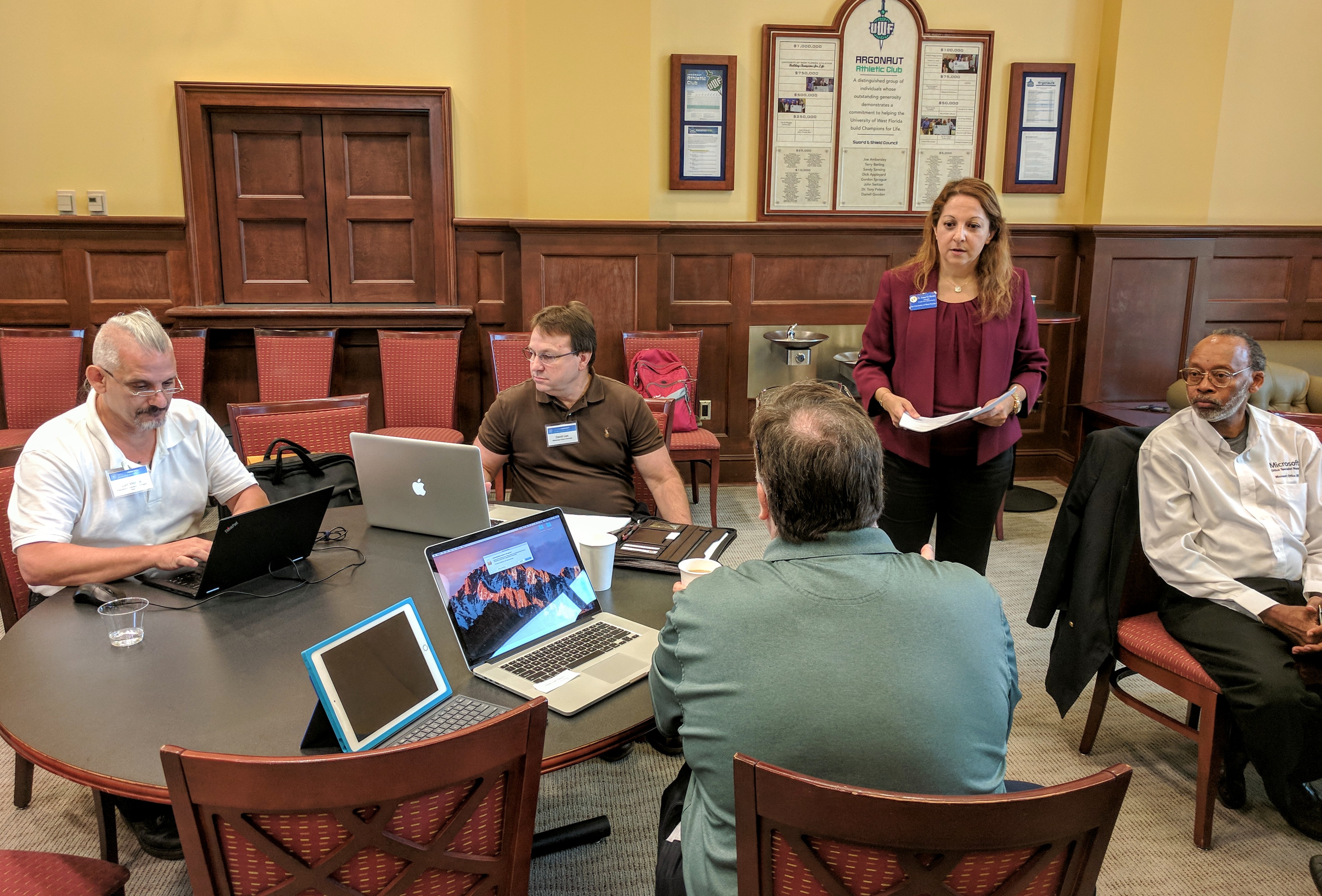Cybersecurity educators benefit from Centers of Academic Excellence workshops at UWF
October 2, 2017

Pursuit of the prestigious National Centers of Academic Excellence in Cyber Defense designation by the National Security Agency and Department of Homeland Security brought John Sewell to the University of West Florida campus on Sept. 27-28.
Sewell, a Palm Beach State College cybersecurity faculty member, attended the two-day NSA/DHS Southeast Region CAE Workshop at the Argo Athletic Club. Sewell said he initiated the designation process for Palm Beach State College about 10 months ago and plans to complete the application process in 2018.
“It would definitely bring recognition to the college and program,” Sewell said of the designation. “It would increase student population and hopefully increase the motivation the students have. I think it would also make them more employable.”
The NSA and DHS designated the University of West Florida as a National Center of Academic Excellence in Cyber Defense Education in Spring 2016. UWF secured designation as the Centers of Academic Excellence Regional Resource Center for the Southeast in April 2017.
The UWF Center for Cybersecurity hosted Cybersecurity workshops at the National Cyber Summit in June 2017 in addition to the workshops hosted at UWF in September 2017. The Secure Software Development/Faculty Development Workshop attracted educators from the Southeast and Midwest on Sept. 21. The attendance doubled the following week for the CAE Application, Knowledge Unit Mapping and Peer Review/Mentoring Workshop.
Sewell said he felt better prepared for the application process after the second workshop.
“This was extremely beneficial,” he said. “The concepts weren’t new to me, but the detail was excellent and provided clarity.”
Institutions complete an arduous application process to secure Centers of Academic Excellence designation. Nelbert "Doc" St. Clair, Information Technology lecturer at Middle Georgia State University, said the agencies rejected the first application from his institution before designating Middle Georgia State in November 2016.
"It’s a long and hard road, but it’s doable," St. Clair said. "The first time we hit the submit button we failed, but you can recover."
Dr. Eman El-Sheikh, UWF Center for Cybersecurity director and computer science professor, and professor Anthony Pinto, UWF Center for Cybersecurity CAE Fellow and computer science lecturer, provided guidance and resources for institutions to address the CAE application criteria and map their cybersecurity programs to the Centers of Academic Excellence Knowledge Units. The mapping ensures programs meet core requirements to prepare students for successful careers.
The first workshop hosted by the UWF Center for Cybersecurity delved into secure software development. Dr. Sidd Kaza, chairperson, Department of Computer and Information Sciences at Towson University, and Dr. Blair Taylor, clinical associate professor, Department of Computer and Information Sciences at Towson University and an NSA contractor, opened the workshop with a presentation that introduced attendees to secure coding through hands-on exercises and self-contained lab-based modules.
The presenters emphasized the importance of implementing stringent security measures. Taylor reported an average of one to seven defects per 1,000 lines of code.
“The most important thing to do to improve security is to create a security mindset,” Taylor said.
Dr. J. Todd McDonald, University of South Alabama computer science professor, and professor Dustin Mink, assistant director of the UWF Center for Cybersecurity, each presented at the afternoon session. They provided an overview of key activities and tools for integrating security into software engineering classes.
Mink addressed secure software development and shared his curriculum for a senior-level class. McDonald touched on the challenge of securing coding. He said the problem has existed since the invention of computers.
“We’re never going to fix it completely, but I’d rather fix it drip by drip than a flood,” McDonald said.
Dr. Maurice Dawson, assistant professor in the Information Science Department at the University of Missouri-St. Louis, traveled from the Midwest for the workshop.
“I felt it was important to see not only what other schools were doing, but to network and see what this region is doing,” said Dawson, who teaches secure programming. “It was interesting to see that a number of presenters are using similar tools that we’re using. It’s reassuring.”
Dawson complimented the efforts of each of the presenters. Taylor, in particular, caught his attention when she spoke about career opportunities at NSA.
“It was interesting to hear some of her thoughts to go after contracts, build student enrollment at institutions and then that will allow them to have an easier path to federal employment,” Dawson said.







